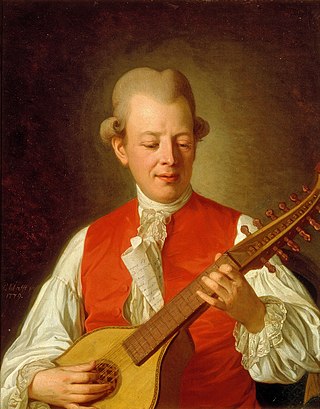
Carl Michael Bellman was a Swedish songwriter, composer, musician, poet, and entertainer. He is a central figure in the Swedish song tradition and remains a powerful influence in Swedish music, as well as in Scandinavian literature, to this day. He has been compared to Shakespeare, Beethoven, Mozart, and Hogarth, but his gift, using elegantly rococo classical references in comic contrast to sordid drinking and prostitution—at once regretted and celebrated in song—is unique.

Fredmans epistlar is a collection of 82 poems set to music by Carl Michael Bellman, a major figure in Swedish 18th century song. Though first published in 1790, it was created over a period of twenty years from 1768 onwards. A companion volume, Fredmans sånger was published the following year.

Märk hur vår skugga is one of the best-known of the 1790 Fredman's Epistles, where it is No. 81. These were written and performed by Carl Michael Bellman, the dominant figure in the Swedish song tradition. Its subject is the funeral of one of Bellman's female acquaintances, Grälmakar Löfberg's wife.

Olof Åhlström was a Swedish civil servant, composer and music publisher.

Ja, må han (hon) leva is a Swedish birthday song. It originates from the 18th century, but the use as well as its lyrics and melody has changed over the years. It is a song that "every Swede" knows and it is therefore rarely printed in songbooks. Both lyrics and melody are of unknown origin. It has a similar melody as the Dutch birthday song "Lang zal hij leven", Dutch-translated Afrikaans wedding song "Lank sal [hy/sy/hul] lewe", Dutch-translated Indonesian birthday song "Panjang Umurnya" and Romanian birthday song "Mulți ani trăiască".

Solen glimmar blank och trind is Epistle No. 48 in the Swedish poet and performer Carl Michael Bellman's 1790 song collection, Fredman's Epistles. The Epistle is subtitled "Hvaruti afmålas Ulla Winblads hemresa från Hessingen i Mälaren en sommarmorgon 1769". One of his best-known and best-loved works, it depicts an early morning on Lake Mälaren, as the Rococo muse Ulla Winblad sails back home to Stockholm after a night spent partying on the lake. The composition is one of Bellman's two Bacchanalian lake-journeys, along with epistle 25, representing a venture into a social realism style.

Ulla! min Ulla! säj, får jag dig bjuda, is one of the Swedish poet and performer Carl Michael Bellman's best-known and best-loved songs, from his 1790 collection, Fredman's Epistles, where it is No. 71. A pastorale, it depicts the Rococo muse Ulla Winblad, as the narrator offers her "reddest strawberries in milk and wine" in the Djurgården countryside north of Stockholm.
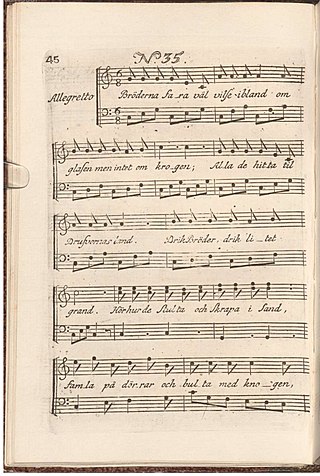
Bröderna fara väl vilse ibland, is a song by the Swedish poet and performer Carl Michael Bellman, from his 1790 collection, Fredman's Epistles, where it is No. 35. The epistle is subtitled "Angående sin Sköna och hännes obeständighet.". The first verse ends "My girl has forgotten me, I'll die faithful. Night and day in drunkenness, shall all my sorrow pass away."
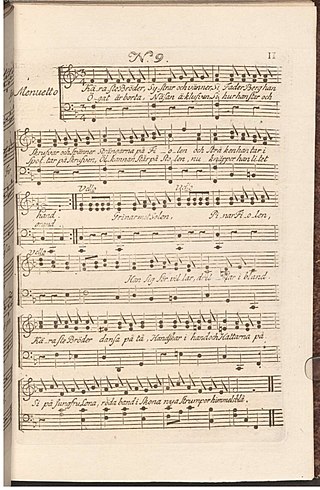
Käraste Bröder Systrar och Vänner is Epistle No. 9 in the Swedish poet and performer Carl Michael Bellman's 1790 song collection, Fredman's Epistles. The epistle is subtitled with the dedication "Til Gumman på Thermopolium Boreale och hännes Jungfrur.", Barbara Ekenberg. It describes the fictional Jean Fredman's cheerful world of brandy, women, and dance, in the setting of a tavern which is halfway to a brothel. The song ends with Fredman's credo, a celebration of everything that is delightful in life.

Blåsen nu alla, "All blow now!", is one of the Swedish poet and performer Carl Michael Bellman's best-known and best-loved songs, from his 1790 collection, Fredman's Epistles, where it is No. 25. It is a pastorale, based on François Boucher's rococo 1740 painting Triumph of Venus.

Glimmande Nymf! blixtrande öga!, is a song by the Swedish poet and performer Carl Michael Bellman from his 1790 collection, Fredman's Epistles, where it is No. 72. It is subtitled "Lemnad vid Cajsa Lisas Säng, sent om en afton", and set to a melody by Egidio Duni. A night-piece, it depicts a Rococo muse in the Ulla Winblad mould, asleep in her bed in Stockholm, complete with allusions to both classical and Nordic mythology.

Käre bröder, så låtom oss supa i frid is Epistle No. 5 in the Swedish poet and performer Carl Michael Bellman's 1790 song collection, Fredman's Epistles. The epistle is subtitled "Til the trogne Bröder på Terra Nova i Gaffelgränden.". The first epistle to be written, it introduces Jean Fredman's fictional world of ragged drunken men in Stockholm's taverns, making music, drinking, and preaching the message of the apostles of brandy, in the style of St Paul's epistles. The composition's approach is simple compared to later epistles, retaining much of the character of a drinking song.
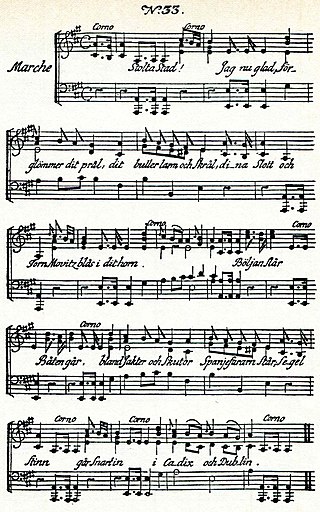
Stolta stad! is Epistle No. 33 in the Swedish poet and performer Carl Michael Bellman's 1790 song collection, Fredman's Epistles. One of his best-known works, it combines both spoken and sung sections. In the spoken sections, Bellman, as composer and as performer, imitates a whole crowd of people of many descriptions. It has been described as Swedish literature's most congenial portrait of the country's capital city, Stockholm.

Movitz blåste en konsert is epistle No. 51 in the Swedish poet and performer Carl Michael Bellman's 1790 song collection, Fredman's Epistles. The epistle is subtitled "Angående konserten på Tre Byttor", naming a restaurant in Stockholm's Djurgården park. It was written after Bellman had become a court musician to the new King Gustav III in 1773. The melody was borrowed from George Frideric Handel's 1718 opera, Acis and Galatea.

Tjenare Mollberg, hur är det fatt? is No. 45 in the Swedish poet and performer Carl Michael Bellman's 1790 song collection, Fredman's Epistles. The epistle is subtitled "Till fader Mollberg rörande hans harpa, och tillika et slags ad notitiam at Mollberg led oskyldigt på Krogen Rostock" ; the song is sometimes known under this name. It describes a fight in a tavern that starts when Mollberg innocently plays a Polska on his harp, leading his audience to assume it was propaganda for Poland.
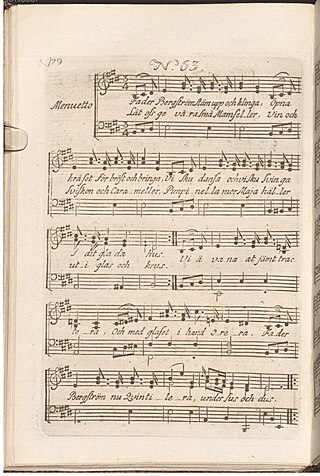
Fader Bergström, stäm upp och klinga is one of the Swedish poet and performer Carl Michael Bellman's songs, from his 1790 collection, Fredman's Epistles, where it is No. 63. The melody is based on a minuet by Carl Envallsson. Bergström was a musician, and the song celebrates dancing and drinking late into the evening. The song, written in 1773, was revised heavily to make it suitable for publication. The initial version, naming Movitz not Bergström as the musician, was an attack on an over-zealous priest who had caused Bellman to be summonsed for an earlier poem that had joked about salvation. The song has been recorded by Bellman interpreters including Fred Åkerström, Fredrik Berg, and Rolf Leanderson.

Fram med basfiolen, knäpp och skruva is Epistle No. 7 in the Swedish poet and performer Carl Michael Bellman's 1790 song collection, Fredman's Epistles. The epistle is subtitled "Som synes vara en elegi, skriven vid Ulla Winblads sang, sent om en afton". It describes an attempt by Jean Fredman to make love to Ulla Winblad, set to a tune from a French operetta, narrated with a combination of biblical allusion and suggestive metaphor. The mention of elegy implies that the song is about death, but the subtext is of the "little death" or female orgasm. Scholars have remarked the epistle's ambiguity, enabling it to work both on a high mythological level and a low worldly level. Similarly, the musician's cello serves both as a musical instrument and as a symbol for Ulla Winblad's body, allowing the singer to mime plucking strings and feeling a woman's body.

Kära Syster is No. 24 in the Swedish poet and performer Carl Michael Bellman's 1790 song collection, Fredman's Epistles. The epistle is subtitled "Till kära mor på Bruna Dörren" ; its themes are drinking and death. One of his best-known works, it is set to a tune extensively modified from one by Egidio Duni for Louis Anseaume's 1766 song-play La Clochette. Bellman's biographer, Carina Burman, calls it a central epistle.

Hör klockorna med ängsligt dån or Fredman's Song no. 6 is one of the Swedish 18th century poet and performer Carl Michael Bellman's Fredman's Songs, written in 1769. It is subtitled Över brännvinsbrännaren Lundholm. It was originally one of the texts for Bellman's Order of Bacchus. It was first performed on 15 October 1769, and quickly became popular, spreading as a transcript. It is structured as a funeral oration for a member of Lundholm's Order, parodying the Swedish system of noble Orders.




















